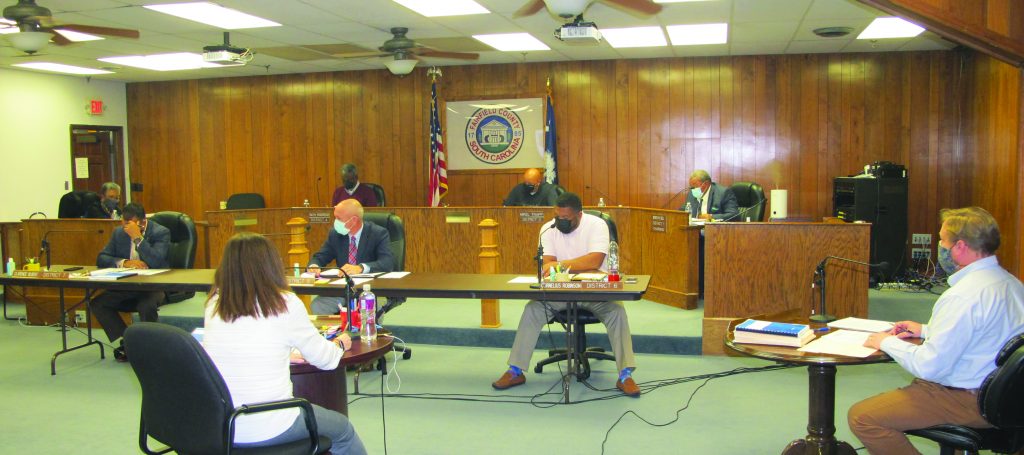
WINNSBORO – At the outset of the Jan. 11 county council meeting, County Councilman Mikel Trapp moved to amend the agenda by postponing the presentation of the county’s annual audit report as well as a discussion regarding County Administrator Jason Taylor’s contract.
Trapp said the two went hand-in-hand. He said he had not been able to review the audit and that understanding the audit would give him a better understanding of how to conduct the dialogue of the administrator’s contract. Council voted 4-3 to defer the two discussions until the next meeting, with Trapp, Council members Shirley Greene and Tim Roseborough and Council Chair Moses Bell voting ‘for.’ Councilmen Clarence Gilbert, Neil Robinson and Douglas Pauley voting ‘against.’
That meeting was held Monday night in council chambers.
Auditor Tom McNeish, representing the county’s auditing firm, Elliott Davis, LLC, said he wanted to start off by saying what a financial statement audit is and what it is not.
“It’s not a fraud audit. It’s an audit of internal control weaknesses. It’s us coming in and giving our opinion as to whether the county’s financial statements are materially correct.
Neisch said that while the audit uncovered significant deficiencies he would not say that those are red flag issues, but things that need to be corrected and brought to management’s attention.
“In our experience with Fairfield County, whenever we’ve identified internal control issues,” Neisch said, “they’ve been remedied very quickly. We found that to be the case this year.”
Of Neisch’s three audit reports, two – the county’s financial statements and its expenditures of grants – were unmodified, clean audit opinions.
“That’s where you want to be,” Neisch said. In his report on government controls, however, he said the audit identified two findings related to internal controls over financial reporting.
One of those findings had to do with the separation of duties regarding wire transfers in the treasurer’s department. Neisch said the county and the treasures’ office now have a solution that is being implemented to accomplish a separation of duties.
The second finding regarding cash management, maintained that the county does not have formal policies and prohave formal policies and procedures in place over financial management. Additionally, the recording and reconciling of investment activity with the county’s accounting records is performed only once at the close of the new fiscal year.
“Without formal financial management policies and procedures, there is an increased risk of misappropriation of funds, as well as the potential for cash flow constraints,” Neisch said. He said the county’s finance team and the treasurer’s office have devised a solution, but he recommended that the county council establish formal policies and procedures over financial management.
Newly seated Councilwoman Shirley Greene and Bell both wanted to revisit findings in fiscal year 2019 related to a pickup truck that was purchased without council’s consent and undocumented pay changes and additional pay for some employees. Greene campaigned on both issues, claiming a lack of administrative supervision. Bell frequently cast accusations of wrongdoing at Taylor from the dias. Both Greene and Bell also had questions about the proposed review of the procurement manual.
“I want to know how you follow up on your findings,” Greene asked Neisch. “How you remediate issues that are carry over. Say, for instance, you have findings from 2019 001 (the purchase of a pickup truck purchased without council approval, page 87 of the audit.)”
“The review of the procurement manual has been completed and we’ve provided the county our report and recommendation,” Neisch said. “As far as the findings that occurred in the prior year, we go in and get additional samples. We look for procurement. We look at additional voucher packages. We walk through the approval process. We do more testing that we wouldn’t normally do just to make sure that we can get comfortable that those items were truly addressed. Same thing for the pay changes and additional pay. There was documentation that we identified as not being in place in the prior year. So we increase our extent of work in testing in that particular area to get comfortable as to whether that’s been remedied.”
The pickup truck findings as well as the pay changes and additional pay findings involved a county employee who resigned. However Bell and to some extent, Greene have publicly blamed the administration for those findings.
“My question would be, from what you found in 2019, through your findings in 2020, in that particular situation were these corrected?” Councilman Douglas Pauley asked Neisch.
“That’s correct. We felt that, for the 2019 findings, your management team came up with a corrective action plan which they’re required to submit in writing. We go in, follow up, give our opinion or our judgment as to whether those two things were done. And based on our follow up testing for the 2019 findings, we felt like, those were remedied,” Neish said.
“I understand the concern about the procurement policy and other policy issues,” Pauley said, “But council needs to look to itself, and not the county administration or staff or the audit team. Under our form of government, the council determines and sets the policy. It is the administrator’s job to execute the policy. Feel free to reference South Carolina code of laws 4-9- 630 regarding the powers and duties of an administrator in the council, administrative form of government,” he said.
“Thank you, Mr. Pauley, so are you saying that procurement manual should have been assumed by counsel?” Bell asked.
“Yes, Sir,” Pauley answered.
Bell had earlier submitted about 15 questions concerning the audit to Bass who answered them to his satisfaction following the audit.
Council approved the audit 7-0.











